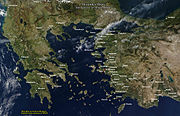- Klazomenai
-
Klazomenai (also spelled Clazomenae, Greek: Κλαζομεναί, modern-day Kilizman in Urla near İzmir in Turkey) was an ancient Greek city of Ionia and a member of the Ionian Dodecapolis (Confederation of Twelve Cities), it was one of the first cities to issue silver coinage.
Contents
Location
Klazomenai is located in modern Urla (Vourla in Greek) on the western coast of Anatolia, on the southern coast of the Gulf of İzmir, at about 20 miles west of İzmir. The city was originally located on the mainland, but probably during the early fifth-century Ionian Revolt from the Persians, it was moved to an island just off the coast, which Alexander the Great eventually connected to the mainland with a causeway. The location of the city-around a harbour, backed by a coastal plain and low hills to the south provided a number of locations for settlement, and as such, settlements did shift from location to location over time. This can be shown by the island of Karantina, located to the north of the settlement area-which became settled at certain points in the history of Klazomenai.
Mythology
The principal god of the city was Apollo. According to myth, swans drew the chariot in which Apollo every year flew south from his winter home in the land of the Hyperboreans. But Klazomenai was also home to large numbers of swans, and it is thought that the verb klazo was used to describe the call of the wild birds. The swan on the obverse is both an attribute of Apollo and a pun on the name Klazomenai.
Ancient times
Though not in existence before the arrival of the Ionians in Asia, its original founders were largely settlers from Phlius and Cleonae. It stood originally on the isthmus connecting the mainland with the peninsula on which Erythrae stood; but the inhabitants, alarmed by the encroachments of the Persians, removed to one of the small islands of the bay, and there established their city. This island was connected with the mainland by Alexander the Great by means of a pier, the remains of which are still visible.
Clazomenae was attacked by the Lydian king Alyattes II in the 6th century.[1] During the 5th century it was for some time subject to the Athenians, but about the middle of the Peloponnesian War (412 BC) it revolted. After a brief resistance, however, it again acknowledged the Athenian supremacy, and repelled a Lacedaemonian attack. In 387 BC Klazomenai and other cities in Asia were taken over by Persia, but the city continued to issue its own coins.
Under the Romans Clazomenae was included in the province of Asia, and enjoyed an immunity from taxation.
Klazomenai is today perhaps best known as the birthplace of the philosopher Anaxagoras, often styled "Anaxagoras of Clazomenae".
Archaeology
The site of Liman Tepe, which lies near an old harbour contains very important Bronze Age excavations, the most prominent and remarkable of which is the amount of varying archaic burial sites, as well as evidence of the practises associated with them close by. One possible explanation for this is that these sites were used by different social groups within society.
The city was famous for production and exports of olive oil and its painted terracotta sarcophagi, which are the finest monuments of Ionian painting in the 6th century BC.
It was also prized for its variety of garum.
Ancient olive press
Olive oil extraction installation (işlik) dating back to the third quarter of the 6th century BC uncovered in Klazomenai is the only surviving example of a level and weights press from an ancient Greek city and precedes by at least two centuries the next securely datable earliest presses found in Greece.[2] It was restored and reconstructed in 2004-2005 through collaboration between Ege University, a Turkish olive-oil exporter and a German natural building components company, as well as by local artisans, on the basis of the clearly visible millstone with a cylindrical roller and three separation pits. The olive oil obtained turned out to be quite a success in business terms as well.
Financial pioneers
In an event noted by Aristotle, Klazomenians also appear as financial pioneers in economic history, for having used one commodity (olive oil), in an organized manner and on a city-scale, to purchase another (wheat), with interests refundable on the value of the first. Around 350 B.C., suffering from a shortage of grain and scarcity of funds, the rulers of the city passed a resolution calling on citizens who had stores of olive oil to lend to the city at interest. The loan arranged, they hired vessels and sent them to ports of exportation of grain and bought a consignment on the pledged security of the value of the oil.[3]
See also
- Urla; İzmir district where Klazomenai is located,
- Limantepe; the prehistoric site in Urla.
References
- ^ Vanessa B. Gorman (2001). 'Miletos, the ornament of Ionia: history of the city to 400 BCE', p. 122 ISBN 047211199X, ISBN 9780472111992. University of Michigan Press.
- ^ Lin Foxhall (2007). Olive Cultivation in Ancient Greece, section 6.3.2. p. 141 (figures) ISBN 0198152884, ISBN 9780198152880. Oxford University Press.
- ^ Fik Meijer, Onno van Nijf (1992). Trade, Transport, and Society in the Ancient World, p. 113 ISBN 0415003458, ISBN 9780415003452. Routledge.
Greaves, A.M., 2010. The Land of Ionia: Society and Economy in the Archaic Period. Malden, MA: Wiley-Blackwell. E. Koparal-E.İplikçi, “Archaic Olive Oil Extraction Plant in Klazomenai”, in A. Moustaka, E. Skarlatidou, M.C. Tzannes, Y. Ersoy (eds.), Klazomenai, Teos and Abdera: Metropoleis and Colony, Proceedings of the International Symposium held at the Archaeological Museum of Abdera (Oct. 2001), Thessaloniki 2004, 221-234.
External links
- Excavations web site
- Map of Ancient Greece from the Metropolitan Museum of Art showing position of Klazomenai (PDF)
Categories:- İzmir Province
- Ancient Greek sites in Turkey
- Ionian League
- Former populated places in Turkey
- History of İzmir Province
Wikimedia Foundation. 2010.






